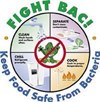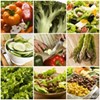Posted 7/4/2012
by Partnership for Food Safety Education

If your power goes out, knowing what to do with the food in your refrigerator and freezer can help you stay healthy. When the power goes out, the most important thing to remember is: keep the fridge and freezer doors closed!
- A closed refrigerator will keep food cold for about 4 hours.
- A full freezer will keep temperature for about 48 hours (24 hours if half-full).
- If the power is going to be out for a long time, buy dry or block ice.
Perishable foods that have not been kept properly chilled can harbor dangerous pathogens that could make you and your family sick. For more information on keeping food through a power outage see the links below.
Remember, when in doubt, throw it out!
Frozen Food and Power Outages:
When to Toss
Refrigerated Food and Power Outages:
When to Toss
Posted 7/2/2012
by Julie Garden-Robinson, North Dakota State University

Overheating can occur fairly quickly, especially among those who aren’t acclimated yet to hot, humid summer weather.
According to the Centers for Disease Control and Prevention, about 700 people die every year due to heat-related illnesses. People most at risk are infants and young children, older adults and people on certain kinds of medications.
In a worst case, you can go beyond overheating and suffer a heat stroke as a result of overexertion in hot, humid weather. Heat stroke can result in unconsciousness, hallucinations, confusion, coma and, potentially, death. Your heart, liver or kidneys can suffer permanent damage.
Posted 6/28/2012
by Stacey Shackford for the Cornell Chronicle Online.

After going without food for 18 hours, most of us would rather reach for French fries or chicken fingers than green beans or carrots, according to a new study from Cornell's Food and Brand Lab.
The study, published June 25 in the journal Archives of Internal Medicine, found that 75 percent of participants placed on an 18-hour fast started their next meal with a starch or a protein rather than a vegetable, compared with 44 percent of non-fasting participants.
And most of the calories consumed during that meal came from whichever food they ate first -- participants consumed about 47 percent more calories from the first food they ate compared with other foods.
Posted 6/25/2012
by Betsy Kelley, University of Wisconsin Extension

Those lazy days of summer we look forward to all year may be setting the stage for your child to gain weight. That was the finding of research published in the American Journal of Public Health which showed that kids often put on added pounds during the summer.
The study attributes the weight gains to not enough physical activity and too much snacking between meals.
Betsy Kelley, outreach specialist with Cooperative Extension’s Family Living Programs, has some suggestions for parents who are concerned about maintaining their children’s healthy weight when school is out.
Posted 6/23/2012
by http://www.fruitsandveggiesmorematters.org

June is Fresh Fruit and Vegetable month. The current Dietary Guidelines for Americans 2010 recommendations support fruits and vegetables as foods that should be eaten most often. And for most Americans, this means more than doubling the amount of fruits and vegetables they eat daily. Only 6% of Americans eat their recommended veggies each day. The average American eats only 43% of the recommended fruit and only 57% of the recommended vegetables each day.
Posted 6/17/2012
by Stacey Shackford for the Cornell Chronicle Online

Youngsters who are asked, "What would Batman eat?" choose foods that are more healthful than children who don't consider the food choices of superheroes, reports a Cornell study.
In the ongoing battle to get children to eat healthfully, parents may do well invoking the names of superheroes to come to their rescue, say Cornell researchers.
Posted 6/10/2012
by Centers for Disease Control and Prevention

When it comes to eating, we have strong habits. Some are good ("I always eat breakfast"), and some are not so good ("I always clean my plate"). Although many of our eating habits were established during childhood, it doesn't mean it's too late to change them.
Making sudden, radical changes to eating habits such as eating nothing but cabbage soup, can lead to short term weight loss. However, such radical changes are neither healthy nor a good idea, and won't be successful in the long run. Permanently improving your eating habits requires a thoughtful approach in which you Reflect, Replace, and Reinforce.
Posted 6/3/2012
by USDA

Year after year, we hear and read the same advice: Handle food carefully in the summer because foodborne illness — also known as "food poisoning" — is more prevalent in warmer weather. Do foodborne illnesses increase during the summer months? If so, why?
Yes, foodborne illnesses do increase during the summer, and the answer appears to be twofold.
Posted 5/25/2012
by Tammy Roberts

There is some debate about whether cooked or raw vegetables are better to consume. The short answer is — don’t choose, have both!
Posted 5/20/2012
by Stacey Shackford for the Cornell Chronicle Online

Once you pop the top of a tube of potato chips, it can be hard to stop munching its contents. But Cornell researchers may have found a novel way to help: Add edible serving size markers that act as subconscious stop signs.
As part of an experiment carried out on two groups of college students (98 students total) while they were watching video clips in class, researchers from Cornell's Food and Brand Lab served tubes of Lays Stackables, some of which contained chips dyed red.
















